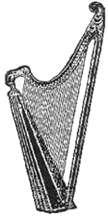|
             
Copyright
Helen Forder
2004
|
|
The
Harp, by Brinley Richards ...
continued
|
page 5
|
|
In Scotland, the harp
appears to have been in use until the sixteenth century, and in Ireland until
the eighteenth century. Indeed, the list of Irish harpers almost rivals
that of Wales, though it may be questioned if the harp was ever as
generally popular among the Irish as among the Welsh; or if it was, it is
singular, that with the exception of Carolan's compositions, there are so
few remains of its music as compared with those possessed by the Welsh.
But, as Carolan died in 1738, and, as we learn that he was ambitious of
imitating Corelli's style, his compositions can hardly be considered examples
of ancient Irish music.
|

|
|
That Scotland was indebted
to Ireland, is highly probable; since the music itself and the manner of
stringing and playing the harp, were alike in both countries; and, as this
was not the case with regard to Wales, it is of itself sufficient
for rejecting the theory of the imputed Irish origin of the Welsh harp.
James I (Scotland) is said to have excelled in the use of many instruments,
and, among others, of the harp. "He
was richt crafty in playing baith of lute and harp" (Bellenden). In the Houlate we read of the 'Psaltery'
and 'Citholis' (a kind of dulcimer), the 'Crowde', the 'Recorder' (a small
flageolet), but not of the 'Harp', unless it be the one signified by the
word Cithill, a quaint term for Cythara, a harp.
|
|
But we are still puzzled to
know how far it resembled what we call 'a harp'. "Probably the Highland music at first, as with all
rude nations, was of a warlike kind; and the harp may only have been
introduced in the course of a barbarous civilisation" (Robertson's Inquiry into the Fine Arts). "In fact",
says Mr. Walker, "the Scots have never
affected extraordinary skill on the harp"; adding, "their
princes and nobility were content to invite harpers from Ireland". Yet another historian (Gunn) asserts that "Scotland surpassed Ireland in music". In one respect, Scotland has an advantage over
Ireland and Wales; as the oldest collection of national music is that in
the famous Skene Manuscripts (between the years 1615 and 1650).
These, however, only serve to prove that the popular instrument at that
time was not the harp; as the music was composed either for the
lute or viol. Nevertheless, there are undoubted proofs that harps similar
to those in Ireland and Wales, were known at an early date in Scotland.
|
|
back 1 2 3 4 5 6 7 8 next
|
|
